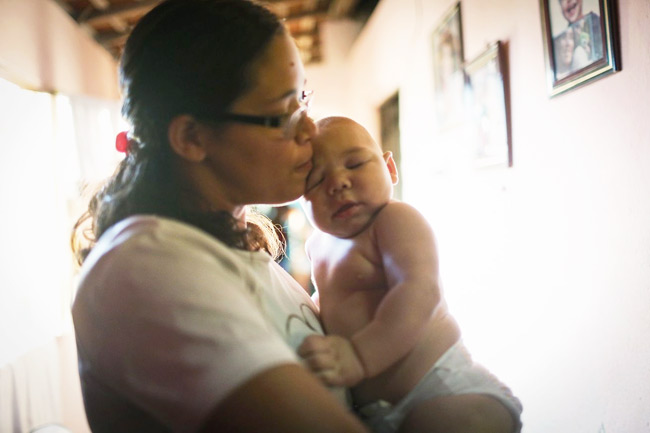Zika Virus: High Alert for Pregnant Women

Under the C.D.C's testing algorithm, pregnant women who have
been to affected regions - whether they have symptoms or not,
and whether they have negative or positive blood tests - should
eventually have an ultrasound scan to see if their fetuses are
developing microcephaly or calcification of the skull.
Unfortunately, an ultrasound usually cannot detect microcephaly
before the end of the second trimester.
Some women also should have amniocentesis to test the fluid
around the fetus for Zika virus. But amniocentesis involves
piercing the amniotic sac with a long needle through the
abdomen; it is slightly risky for the fetus and is not
recommended before 15 weeks gestation.
Several companies are working on rapid tests for Zika infection.
The C.D.C. also usually distributes test kits and training
materials to state health departments during outbreaks, which
should increase testing capacity.
Half of pregnancies are unintended. If you want to visit a
country where Zika transmission has been reported, Dr. Laura E.
Riley, a specialist who works with high-risk pregnancies and
infectious disease at Massachusetts General Hospital, advises
strict use of birth control to ensure you don't get pregnant.
Women who become unexpectedly pregnant while traveling or
shortly afterward will face blood tests, monthly ultrasounds and
a great deal of anxiety.
"Why would you ever sign yourself up for that?" said Dr. Riley.
"There's enough in life to worry about. I wouldn't add that to
my list."
With rare exceptions, the virus does not appear to linger in the
body, and people who recover from the infection are immune.
"Our understanding, thus far, is that the risk is very, very low
if you were in that place prior to conception," said Dr. Laura
E. Riley of Massachusetts General Hospital.
"I wouldn't be worried about if you conceived after you got back
to the U.S."
The most dangerous time is thought to be during the first
trimester - when some women do not realize they are pregnant.
Experts do not know how the virus enters the placenta and
damages the growing brain of the fetus.

Closely related viruses, including yellow fever, dengue and West
Nile, do not normally do so. Viruses from other families,
including rubella (German measles) and cytomegalovirus,
sometimes do.
Federal health officials say that newborns should be tested for
infection with the Zika virus if their mothers have visited or
lived in any country experiencing an outbreak and if the
mothers' own tests are positive or inconclusive.
The reason, officials said in interviews, is that infection with
the virus could be linked to defects in vision and hearing,
among other abnormalities, even if the child does not suffer
microcephaly. The other defects may require further assessments
and testing.
The new guidance applies only to infants of mothers who reported
symptoms of Zika virus infection - a rash, joint pain, red eyes
or fever - while living abroad in an affected country or within
two weeks of travel to such a destination.
The C.D.C. does not recommend a particular antiviral medication
for people infected with the Zika virus. The symptoms are mild -
when they appear at all - and usually require only rest,
nourishment and other supportive care.
There is no vaccine against the Zika virus. Efforts to make one
have just begun, and creating and testing a vaccine normally
takes years and costs hundreds of millions of dollars.
Because it is impossible to completely prevent mosquito bites,
the C.D.C. has advised pregnant women to avoid going to regions
where Zika is being transmitted, and has advised women thinking
of becoming pregnant to consult doctors before going.
Travelers to these countries are advised to avoid or minimize
mosquito bites by staying in screened or air-conditioned rooms
or sleeping under mosquito nets, wearing insect repellent at all
times and wearing long pants, long sleeves, shoes and hats.
Microcephaly is rare, and it has many other causes, including
infection of the fetus with rubella (German measles),
cytomegalovirus or toxoplasmosis; poisoning of the fetus by
alcohol, mercury or radiation; or severe maternal malnutrition
and diabetes. It is also caused by several gene mutations,
including Down syndrome.
Until recently, health officials paid little attention to Zika
virus. It circulated in the same regions as dengue and
chikungunya, and compared to those two painful infections -
nicknamed "break-bone fever" and "bending-up fever" - Zika was
usually mild.
The virus is thought to have reached Asia from Africa at least
50 years ago. While it may have caused spikes in microcephaly as
it first spread, there was no testing to pin down which of many
possible causes was to blame.
In 2007, a Southeast Asian strain of the Zika virus began leap-frogging
the South Pacific, sparking rapid outbreaks on islands where no
one had immunity to it. Because island populations are small,
rare side effects did not occur often enough to be noticed. But
in 2013, during an outbreak in French Polynesia, which has
270,000 residents, doctors confirmed 42 cases of Guillain-Barre
syndrome, which can cause paralysis. That was about eight times
the normal number and the first hint that Zika virus can attack
the nervous system, which includes the brain.

Zika was first confirmed in Brazil - a country of 200 million -
last May, and it spread like wildfire. The first alarms about microcephaly were raised only in October, when doctors in the
northeastern state of Pernambuco reported a surge in babies born
with it. Pernambuco has nine million people and 129,000 annual
births. In a typical year, nine are microcephalic infants.
By November 2015, when Brazil declared a health emergency,
Pernambuco had had 646 such births.
French Polynesia is the only area outside of Brazil to be
affected by a Zika outbreak in which public health officials
have identified an increase in the number of fetuses and babies
with unusually small heads. There is "very high suspicion" of a
link between the Zika virus and microcephaly in French
Polynesia, said Dr. Didier Musso, an infectious disease
specialist at the archipelago's Institut Louis Malarde - though
he said additional research was still needed.
Last November French Polynesian officials re-investigated an
outbreak of Zika that lasted from October 2013 to April 2014.
They reported finding an unusual increase - from around one case
annually to 17 cases in 2014-15 - of unborn babies developing
"central nervous system malformations," a classification that
includes microcephaly.
There were no investigations at the time to determine whether
the mothers were infected with Zika virus during pregnancy. Four
of the mothers were tested later and the results indicated they
may have been infected with the virus. Additional research is
underway, Dr. Musso said.
We do not know the risk to an infant if a woman is infected with
Zika virus while she is pregnant. Zika virus usually remains in
the blood of an infected person for only a few days to a week.
The virus will not cause infections in an infant that is
conceived after the virus is cleared from the blood. There is
currently no evidence that Zika virus infection poses a risk of
birth defects in future pregnancies. A women contemplating
pregnancy, who has recently traveled to an area with local Zika
transmission, should consult her healthcare provider after
returning.
Women Fitness advice's pregnant women to follow all precautions
from getting infected from zika virus, as it has no cure.
